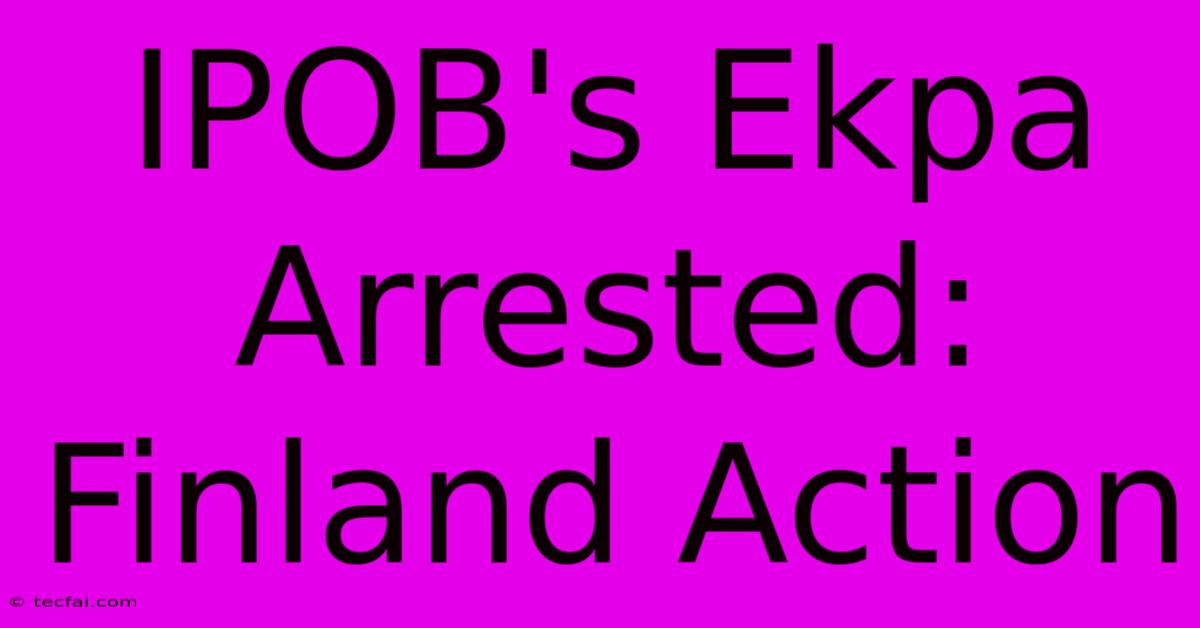IPOB's Ekpa Arrested: Finland Action

Discover more detailed and exciting information on our website. Click the link below to start your adventure: Visit Best Website tecfai.com. Don't miss out!
Table of Contents
IPOB's Ekpa Arrested: Finland Action Sends Shockwaves Through Biafra Movement
The arrest of Simon Ekpa, a self-styled disciple of Nnamdi Kanu and a prominent figure within the Indigenous People of Biafra (IPOB) movement, in Finland has sent ripples of shock and uncertainty through the Biafran separatist movement. This seemingly low-key arrest in a European nation holds significant geopolitical implications, impacting not just the immediate future of IPOB but also broader discussions surrounding secessionist movements in Nigeria.
The Significance of Ekpa's Arrest
Ekpa's arrest, while seemingly isolated, carries considerable weight. He was a key figure in broadcasting inflammatory messages and allegedly inciting violence, particularly during the sit-at-home orders implemented in the southeastern region of Nigeria. These orders, often enforced through threats and intimidation, severely disrupted economic activity and daily life. Attributing specific acts of violence directly to Ekpa might be challenging, but his influence in galvanizing support for these actions is undeniable. Therefore, his apprehension is seen by many as a significant blow to the hardline faction of IPOB.
Finland's Role and International Implications
Finland's involvement in this arrest adds an international dimension to the conflict. It highlights the growing international awareness and concern regarding IPOB's activities and their potential impact on regional stability. The arrest underscores the fact that even actions undertaken within a seemingly distant country can have far-reaching consequences. Finland’s decision to act, likely based on compelling evidence of Ekpa’s alleged crimes, sets a precedent and raises questions about the broader role of European nations in addressing the activities of foreign-based groups that incite violence and disrupt stability in other regions.
Reactions and Potential Fallout
The arrest has evoked mixed reactions. While many in Nigeria welcome the development, hoping for a reduction in violence and a return to normalcy, others within the Biafra movement express concerns about human rights violations and potential political motivations. The situation remains volatile. The potential fallout includes:
- Increased internal conflict within IPOB: The power vacuum left by Ekpa's absence could lead to infighting amongst various factions within the movement.
- Shifting tactics by IPOB: The group may adopt different strategies, potentially shifting towards more covert operations or altering its communication methods.
- Continued civil unrest: The arrest might not immediately quell violence, as some hardline elements within IPOB may retaliate or continue their activities.
- International pressure on Nigeria: The arrest also puts pressure on the Nigerian government to address the underlying grievances that fuel the Biafran separatist movement, including issues of marginalization and inequality.
The Path Forward: Addressing Underlying Issues
Ekpa's arrest is not a simple solution to the complex issue of Biafran separatism. While the arrest may disrupt the immediate activities of a key figure, it's crucial to address the root causes of the conflict. This involves engaging in meaningful dialogue, promoting inclusivity, and tackling issues of inequality and marginalization in the southeastern region of Nigeria. Long-term peace and stability will require a multi-faceted approach that goes beyond law enforcement and tackles the underlying social and political issues driving the movement.
Keywords: Simon Ekpa, IPOB, Indigenous People of Biafra, Nnamdi Kanu, Biafra, Finland, Arrest, Nigeria, secessionist movement, civil unrest, sit-at-home, political violence, international implications, geopolitical impact.

Thank you for visiting our website wich cover about IPOB's Ekpa Arrested: Finland Action. We hope the information provided has been useful to you. Feel free to contact us if you have any questions or need further assistance. See you next time and dont miss to bookmark.
Featured Posts
-
Maple Leafs Injury Matthew Out No Return Date
Nov 22, 2024
-
Salmonella In Dunnes Chicken Wings
Nov 22, 2024
-
Leafs React To Knies Performance
Nov 22, 2024
-
Black Friday Smart Ring Expert Picks
Nov 22, 2024
-
Bupa At Healthscope Continued Coverage
Nov 22, 2024
